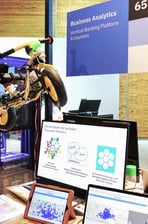
More than 2,800 exhibitors from all over the world, around 600 speakers on ten stages and 370 startups provided visitors to CeBIT 2018 a comprehensive insight into current and future trends in the field of digital transformation. For the first time in Hanover: knowis AG as customer and business partner of IBM. Using an innovative mobility concept as an example, the Regensburg software company demonstrated how banks can open up completely new business models through the use of platform technology.
After CeBIT had to contend with a sharp drop in visitor numbers in recent years, the event concept was completely redesigned this year. A conglomerate of Expo, conference and networking event offered the 120,000 fairgoers insight into areas such as artificial intelligence, robotics and future mobility. Exhibitors, exhibition operators and visitors are pleased with the results, even though it will probably take few years before CeBIT has fully rehabilitated itself.
CeBIT 2018 was a complete success for Heiko Meyer, chairman of the trade fair committee and head of Hewlett Packard Enterprise Germany: "With the significantly changed character of the event, we have achieved all our goals. Oliver Frese, Member of the Board of Management of the trade fair, also emphasised: The old format of a pure business fair from 2014 to 2016 no longer worked, which is why the system was turned upside down. The new Cebit is no longer comparable with the old one. CeBIT 2019 will again be postponed slightly. From June 24th to 28th 2019 the fair will open its gates again.
IBM at the CeBIT
Ginni Rometty, CEO and President of IBM, explained in her keynote speech at the CeBIT Welcome-Night the importance of cloud technology in connection with artificial intelligence for today's society. Data is the greatest challenge and at the same time the greatest opportunity of our time - the cloud is the goal everyone is inevitably heading for. This era of digital change will change 100% of all jobs and business models.
Artificial intelligence played a fundamental role at IBM's CEBIT presentation. The IBM Watson platform enables companies to make well-founded decisions and take advantage of new forms of collaboration through linked information. "In general, our aim is to show which technologies or skills we can use to improve our economy, the environment and our lives," explained company spokeswoman Christine Paulus. Cloud technology was also omnipresent in the IBM environment and has emerged as a key technology for many future projects. knowis AG, IBM's customer and business partner, presented in a joint showcasse a scenario for using linked data on a platform at the IBM Pavilion.
Matthias Hartmann, General Manager IBM/DACH, also emphasized the importance of platform technologies for digital transformation in an interview at CeBIT, but emphasized that this is more than just a technology topic. It is equally about the further development of culture and business models.
The transition to digital culture is a challenge
Large companies are often slow to implement change and innovation. This is due on the one hand to the complex internal structures and processes, and on the other to the far-reaching consequences of decisions taken. Especially companies whose core market is not based in the technology sector often miss the starting signal of new trends in the market and need a lot of energy to catch up with their agile competitors and keep pace.
Even in the technology sector, there are prominent examples such as Nokia, once a leading manufacturer in the field of mobile phones with a market share of well over 50 percent, which missed the turnaround from mobile phones to smartphones. The Finnish company reacted late, relied first on the wrong technology, then on the wrong operating system and disappeared into insignificance within a few years.
Digital transformation is particularly difficult for banks
It is obvious that the adaptation of digital structural changes is still much less in the focus in technology-remote industries. In the financial sector, for example, digital change has long been ignored, especially by large financial institutions. Small, flexible companies and start-ups, the so-called FinTechs, sensed their opportunity and began to meet customers' digital expectations for individual banking processes. In the course of time, the holistic business model of large financial service providers has been challenged almost unnoticed by a steady increase in small, specialized competitors.
Almost all services of large banks are now also offered in segments by small providers - perfectly adapted to customers' digital lifestyles and scalable as required through the use of cloud technology. Many small companies cause the big players to stumble, since the customer no longer has any added value from remaining loyal to his traditional bank. Meanwhile, respected economic experts are already predicting the great death of banks in Germany in the coming years for all financial institutions that do not redefine their business model and continue to develop technologically.
Adapting the business model using an innovative mobility concept as an example
IBM recognized the problem at an early stage and presented solutions to the challenges of digitization in many different showcases with partner companies at CeBIT. One of them was knowis AG, customer and business partner of IBM. The potential of linked information in the banking area was demonstrated by knowis at the showcase of a mobility concept.
With the GO2BANK-App, knowis presented in a live demo how bank customers can be enabled to handle shared mobility quickly and securely via the app of a financial service provider – without signing up to the relevant mobility provider or submit personal data.

Visitors of CeBIT were able to view available bikes of different suppliers in the surrounding area and book the knowis bike online. The data of the bikes came from a real web interface, only the knowis bike was added manually to the database for demonstration purposes. If the test bike was booked, a signal light came into action - until its return was confirmed by pressing a button on the bike. Users could immediately see the billing data in the app, which would have been paid automatically by the linked bank account in a real scenario.
Bike sharing is just one of many examples
The bike was rather exemplary in this showcase, the concept can be applied 1:1 to car sharing, public transport or other services. Banks already manage a lot of verified and trustworthy information about their customers. By connecting information, this data can be used via secure interfaces, for example as identification for services, and the linked account can be used for automated payments.

"The showcase of GO2BANK is only one aspect of how the value chains of banks and partners can be combined to create additional value for the customer," explains Gerald Gassner, CEO of knowis AG.
The advantages for the parties involved are manifold:
- With such a solution, the bank can also act as an identity provider and trust entity, in addition to offering traditional financial services, and utilize this as an instrument for customer loyalty or as an additional business model.
- The advantage for the customer: The sharing of user and payment data to many different platform providers is completely eliminated, as bank and provider only exchange one ID. In addition, customers can compare different providers on one platform and easily track all payment flows.
- The participating mobility partners can reach new customers via an existing ecosystem which they would not reach via their own network, and thus significantly expand their customer base.
This mobility concept is also interesting for companies
The usecase is also addressed to companies that want to provide their employees with urban mobility without building up their own vehicle fleet. In this scenario, the bank is both the vehicle broker and the responsible agency for managing the settlement data. Employees use their banking app to book a nearby vehicle, mark the booking as a business trip and simply park it at the end of use. The parking position, travelled distance and booking duration are automatically processed, synchronized with the mobility provider and billed to the employer.
No additional effort is required for any of the partners: the banking platform in the background takes care of everything administrative.
Image Sources: Teaser - Deutsche Messe; Images in text: IBM/knowis AG








